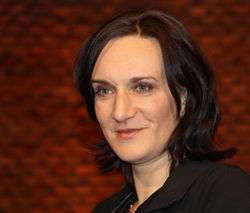Terézia Mora

Terézia Mora ([ˈtɛreːziɒ ˈmorɒ]; born 5 February 1971) is a Hungarian writer, screenwriter and translator.
Life
Terézia Mora was born in Sopron, Hungary, to a family with German roots and grew up bilingual.[1]
She moved to Germany after the political changes in Hungary in 1990 in order to study Hungarian studies and drama at the Humboldt University in Berlin. Subsequently she trained as a screenwriter at the Deutsche Film- und Fernsehakademie Berlin.[2]
Mora is working on a trilogy about the IT specialist Darius Kopp, of which band I "The Only Man on the Continent" and Volume II "The Monster" have already appeared.
She is a member of the German PEN Center and the German Academy of Language and Poetry, whom she was elected by as a member in 2015.[3]
Since 1990 she has lived in Berlin, working as a freelance writer, writing in German.[3][4]
Mora is married and has one daughter.[2]
Awards and honours
In 1999 she received the Ingeborg Bachmann Prize for Der Fall Ophelia, part of her first collection of short stories Seltsame Materie. In 2007, she received Austrian Franz-Nabl-Preis. In January 2010, she was awarded the German Adelbert-von-Chamisso prize. In October 2013, Mora won the 2013 German Book Prize for her novel Das Ungeheuer.[5]
On July 3, 2018, it was announced by the German Academy for Language and Literature that she will be presented the Georg Büchner Prize, one of Germany's highest literary honors, at a ceremony in October 2018. The prize comes with an award of 50,000 euros.[6]
- 1997: Würth Literature Prize for her screenplay The Ways of Water in Erzincan and the Open-Mike-Literary Prize of the Berliner LiteraturWERKstatt for the tale Durst
- 1999: Ingeborg Bachmann Prize for the narration The case of Ophelia, contained in her first volume of stories Strange Matter
- 2000: Adelbert von Chamisso Award
- 2001: Island writer on Sylt
- 2002: Jane Scraberd Prize of the Heinrich Maria Ledig-Rowohlt Foundation for her translation of Péter Esterházy's Harmonia Caelesti
- 2004: Mara Cassens Prize, Prize for the Art Prize of the Academy of Arts (Berlin), Prize of the Leipzig Book Fair for her novel Alle Tage (Category: Fiction)
- 2005: Prize of LiteraTour Nord
- 2006: Villa Massimo scholarship
- 2006/2007: Tübingen Poetry Lecturer together with Péter Esterházy
- 2007: Franz Nabl Prize
- 2010: Adelbert von Chamisso Prize, Erich Fried Prize
- 2011: Translation Prize of the Kunststiftung NRW for her translation by Péter Esterházys A production novel (two production novels) from the Hungarian and at the same time for her life's work [5]
- 2011: "Grenzgänger-Scholarship" by the Robert Bosch Foundation for research on The Monster2013: German Book Prize for The Monster
- 2013/2014: Frankfurt Poetics Lecturer
- 2017: Bremen Literature Prize for Love Among Aliens
- 2017: Prize of the Literaturhäuser
- 2017: Solothurn Literature Prize
- 2018: Roswitha Prize[7]
- 2018: Georg Büchner Prize[8]
Works
Prose
- Strange matter, Rowohlt Verlag, Reinbek 1999, ISBN 3-498-04471-0
- Alle Tage, Luchterhand Literaturverlag, Munich 2004, ISBN 3-630-87185-2
- The only man on the continent, Luchterhand Literaturverlag, Munich 2009, ISBN 3-630-87271-9
- The monster, Luchterhand Literaturverlag, Munich 2013, ISBN 3-630-87365-0
- Love among aliens, narratives. Luchterhand Literaturverlag, Munich 2016, ISBN 978-3-630-87319-0
Poetry lectures
- Do not die, Luchterhand Literaturverlag, Munich 2015, ISBN 978-3-630-87451-7
- The secret text. Salzburger Stefan branch Poetikvorlesung, special number publishing house, Vienna 2016, ISBN 978-3854494515
Screenplays
- The Ways of Water in Erzincan, feature film, 30 min. (1998)
- Boomtown / End of the City, feature film, 30 min. (1999)
- The Alibi, screenplay for a thriller shown in German TV[9], 90 min. (2000)
Plays
- Something like that (2003)
Audiobooks
- Miss June Ruby (2005)
Essays
- About the drastic, in: BELLA triste No. 16 (2006)
Translations
- Als nur die Tiere lebten (2014), translation of Amikor még csak az állatok éltek, (2012), by Zsófia Bán.
- Abendschule – Ein Fibel für Erwachsene (2012), translation of Esti iskola – Olvasókönyv felnőtteknek, (2007), by Zsófia Bán
References
- ↑ "Terézia Mora - Was bedeutet die Zweisprachigkeit für Ihr Schreiben?". Deutschlandfunk Kultur (in German). Retrieved 2018-08-02.
- 1 2 Krekeler, Elmar (2013-10-07). "Deutscher Buchpreis: Terézia Mora – Eine Frau schreibt sich in die Freiheit". DIE WELT. Retrieved 2018-08-02.
- 1 2 "Deutsche Akademie für Sprache und Dichtung - Akademie - Presse - Neue Mitglieder". www.deutscheakademie.de (in German). Retrieved 2018-08-02.
- ↑ "Roman "Das Ungeheuer": Terézia Mora erhält Deutschen Buchpreis". Spiegel Online. 2013-10-07. Retrieved 2018-08-02.
- ↑ "Terézia Mora wins the German Book Prize 2013 for her novel "Das Ungeheuer"" (Press release). Deutscher Buch Preis. 7 October 2013. Archived from the original on 11 October 2013. Retrieved 8 October 2013.
- ↑ https://www.deutscheakademie.de/en/awards/georg-buechner-preis
- ↑ NDR. "Roswitha-Preis 2018 geht an Terézia Mora" (in German). Retrieved 2018-08-02.
- ↑ "Terezia Mora erhält Georg-Büchner-Preis". news.ORF.at (in German). 2018-07-03. Retrieved 2018-08-02.
- ↑ https://www.imdb.com/title/tt0215385/?ref_=nmbio_mbio
External links
- Terézia Mora in the German National Library catalogue
- http://www.tereziamora.de